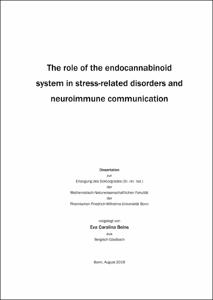Beins, Eva Carolina: The role of the endocannabinoid system in stress-related disorders and neuroimmune communication. - Bonn, 2020. - Dissertation, Rheinische Friedrich-Wilhelms-Universität Bonn.
Online-Ausgabe in bonndoc: https://nbn-resolving.org/urn:nbn:de:hbz:5-57950
Online-Ausgabe in bonndoc: https://nbn-resolving.org/urn:nbn:de:hbz:5-57950
@phdthesis{handle:20.500.11811/8344,
urn: https://nbn-resolving.org/urn:nbn:de:hbz:5-57950,
author = {{Eva Carolina Beins}},
title = {The role of the endocannabinoid system in stress-related disorders and neuroimmune communication},
school = {Rheinische Friedrich-Wilhelms-Universität Bonn},
year = 2020,
month = may,
note = {In the last decades, increasing evidence suggests that inflammatory processes play an important role in the development of psychiatric disorders, such as anxiety and depression. Psychosocial stress – one of the main environmental factors contributing to these disorders – affects immune system activity through neuronal and endocrine signals. The endocannabinoid system (ECS) is a neuromodulatory system that regulates stress responses via the cannabinoid receptor 1 (CB1). Blockade of CB1 signalling, either pharmacologically or genetically, increases the sensitivity to stress and the risk to develop stress-related psychiatric pathologies. Whether this is based on a purely neuronal mechanism or whether it is accompanied or mediated by altered immune system regulation is, however, not known. The aim of this study was therefore to analyse how CB1 signalling modulates behavioural, neuroendocrine, and immunological responses in a mouse model of chronic social defeat stress (CSDS).
CB1-deficient (Cnr1-/-) mice were extremely sensitive to a standard protocol of CSDS, indicated by an increased mortality rate. Therefore, a mild CSDS protocol was established, which still induced a behavioural phenotype in highly susceptible Cnr1-/- mice. Molecular analysis showed that lack of CB1 receptors alters glucocorticoid levels after mild CSDS, supporting the hypothesis that CB1 signalling regulates hypothalamic–pituitary–adrenal (HPA) axis activity and its adaptation during repeated stress exposure.
In both humans and rodents, chronic stress is associated with elevated inflammatory signalling. This is indicated by increased numbers of circulating myeloid cells, which possibly infiltrate the brain, and the activation of microglia – the brain-resident immune cells. Mild CSDS induced weak myelopoiesis in the periphery, but did not induce recruitment of myeloid cells to the brain. In contrast, mild CSDS did affect microglial function in Cnr1-/- mice, indicated by increased surface expression of activation markers and altered morphology. Furthermore, microglial parameters were correlated with the severity of the behavioural phenotype in Cnr1-/- mice, thus implicating endocannabinoid-mediated modulation of microglia in the development of stress-related pathologies.
In summary, the present study indicates that ECS/CB1 signalling is indeed essential to protect the organism from the physical and emotional harms of chronic stress. These protective mechanisms involve modulation of the HPA axis and microglial function.},
url = {https://hdl.handle.net/20.500.11811/8344}
}
urn: https://nbn-resolving.org/urn:nbn:de:hbz:5-57950,
author = {{Eva Carolina Beins}},
title = {The role of the endocannabinoid system in stress-related disorders and neuroimmune communication},
school = {Rheinische Friedrich-Wilhelms-Universität Bonn},
year = 2020,
month = may,
note = {In the last decades, increasing evidence suggests that inflammatory processes play an important role in the development of psychiatric disorders, such as anxiety and depression. Psychosocial stress – one of the main environmental factors contributing to these disorders – affects immune system activity through neuronal and endocrine signals. The endocannabinoid system (ECS) is a neuromodulatory system that regulates stress responses via the cannabinoid receptor 1 (CB1). Blockade of CB1 signalling, either pharmacologically or genetically, increases the sensitivity to stress and the risk to develop stress-related psychiatric pathologies. Whether this is based on a purely neuronal mechanism or whether it is accompanied or mediated by altered immune system regulation is, however, not known. The aim of this study was therefore to analyse how CB1 signalling modulates behavioural, neuroendocrine, and immunological responses in a mouse model of chronic social defeat stress (CSDS).
CB1-deficient (Cnr1-/-) mice were extremely sensitive to a standard protocol of CSDS, indicated by an increased mortality rate. Therefore, a mild CSDS protocol was established, which still induced a behavioural phenotype in highly susceptible Cnr1-/- mice. Molecular analysis showed that lack of CB1 receptors alters glucocorticoid levels after mild CSDS, supporting the hypothesis that CB1 signalling regulates hypothalamic–pituitary–adrenal (HPA) axis activity and its adaptation during repeated stress exposure.
In both humans and rodents, chronic stress is associated with elevated inflammatory signalling. This is indicated by increased numbers of circulating myeloid cells, which possibly infiltrate the brain, and the activation of microglia – the brain-resident immune cells. Mild CSDS induced weak myelopoiesis in the periphery, but did not induce recruitment of myeloid cells to the brain. In contrast, mild CSDS did affect microglial function in Cnr1-/- mice, indicated by increased surface expression of activation markers and altered morphology. Furthermore, microglial parameters were correlated with the severity of the behavioural phenotype in Cnr1-/- mice, thus implicating endocannabinoid-mediated modulation of microglia in the development of stress-related pathologies.
In summary, the present study indicates that ECS/CB1 signalling is indeed essential to protect the organism from the physical and emotional harms of chronic stress. These protective mechanisms involve modulation of the HPA axis and microglial function.},
url = {https://hdl.handle.net/20.500.11811/8344}
}






